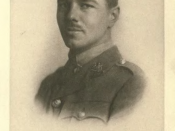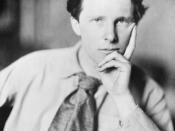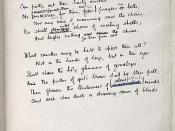Rupert Brooke and Wilfred Owen are poets who fought for England in the First World War. Both poets depict the same topic of war, but through different views and opinions. Despite them pertaining to the similarly themed subject, their language and tone invoke contrasting feelings in readers and affects their impression of war in opposite ways. Examples of these differences can be seen in the two poems by Rupert Brook 'The Dead (iii) and 'The Soldier' and two by Wilfred Owen 'Anthem for Doomed Youth' and 'Dulce et Decorum Est'.
Rupert Brooke writes 'The Dead (iii)' in an extremely relaxed and romantic mood. Brooke had not experienced war, so with this in mind the poem seems very clear and concise. Brooke aims to show us the glory that is brought about by dying for your country. He thinks that war is a simple and dignified cause. He aims to make us more patriotic and convince us to die for our country in war.
The first line is very energetic and joyous for a horrendous subject such as war. This may mean that Brooke tries to symbolise enthusiasm and glory. Since bugles are used at a grand occasion, but also militarily charges and retreats he may be trying to indicate that dying for your country is a glorious way to end your life.
"Blow out, you bugles, over the rich Dead!"
As he says, it has made them 'rich'. This probably means that they are wealthy with glory, praise and admiration. He makes no mention of the pain and suffering in war. The third line explains that dying has again made them important.
But, dying has made us rarer gifts than gold.
Gold is very rare, so by dying they have been them valuable and unique. Brooke is trying to signify...


